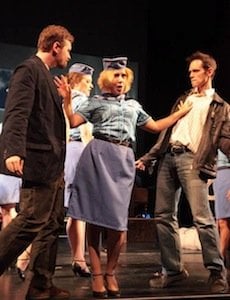
Photos by Jamie Buschbaum
Ah, the wages of sin. Greed, lust, vanity, and mendacity may lead to a life of misery, but they can usually be counted on to inspire rewarding works of musical theater. This month at West Edge Opera, they’re yielding the reasonably entertaining, if rather uneven, double bill of Vera of Las Vegas, by Daron Hagen and Paul Muldoon, and the Mahagonny Songspiel of Bertolt Brecht and Kurt Weill.
Hagen and Muldoon’s hour-long “popera” emerged the chief attraction of Sunday afternoon’s opening performance at the El Cerrito Performing Arts Theater, with the 30-minute Brecht–Weill songspiel — the forerunner of the composers’ evening-length Rise and Fall of the City of Mahagonny — serving as the curtain-raiser. Presented under the title “City of Sin,” the dual production repeats through Aug. 5 as the final offering of West Edge’s 2011–2012 season.
Vera follows a pair of former Irish Republican Army gunsels making their way from New York to Los Angeles with the goal of becoming contestants on Wheel of Fortune. Taco Bell and Dumdum Devine are dim-bulb grifters for whom Dashiell Hammett might have written his famous line “the cheaper the crook, the gaudier the patter.” When a twist of fate lands them in a Las Vegas layover, it’s clear from the start that they’re in over their heads; right away, they meet two women — Doll, a hard-boiled INS officer, and the title character, a mysterious transvestite lap-dancer. Taco and Vera are irresistibly drawn to one another, and a romantic interlude follows.
It doesn’t end well (these things never do), yet the situation gives composer Hagen and librettist Muldoon plenty of opportunities for surreal-comic expansion. As Taco and Dumdum recall their past misdeeds and riff on pop culture references, from Tom Jones and Engelbert Humperdinck to Bono and The Edge, a women’s chorus rises from the pit at key intervals to comment as flight attendants, pole dancers, nuns, and blackjack dealers. There’s a larky dance in a wedding chapel for hermaphrodite brides and an Elvis impersonator. Sentimentality intrudes with Doll’s reverie on her show-biz beginnings. An aria for the title character (who shares a last name with Willy Loman) delves into a mournful past.
Mahagonny Songspiel Score(s)

Hagen’s score slips and slides through jazzy flights, stock lounge-lizard constructions, and ear-catching atonal harmonies, while the vocal writing tends to flatter the singers. Jonathan Khuner, conducting from the piano, led a 10-piece onstage band through the hour-long performance, mostly without incident. Staging, by West Edge Artistic Director Mark Streshinsky and aided by Jeremy Knight’s amusingly literal video projections, mined Muldoon’s poetry for maximum humor, and the cast delved into their parts with considerable gusto. Countertenor Brian Asawa, a San Francisco Opera veteran making his West Edge debut, sang the title role with stylistic allure and an air of bruised sensuality. Tenor Thomas Glenn made a guileless, articulate Taco, and bass-baritone Paul Murray was a solid Dumdum. Soprano Heidi Moss exuded steely appeal as Doll.
The Mahagonny Songspiel also features plenty of dissipation, as well as better music, and Khuner conducted a mordant, shapely performance of it. But Elkhanah Pulitzer’s staging of the satire didn’t bite, and the production — dressed with a ladder, a raised platform, and a trunk — was visually uninteresting. Pulitzer has directed effectively for West Edge in past seasons (her production of Copland’s Tender Land was ideal), but here, it all felt a little slapdash. Knight’s projections seemed an afterthought, and the performers, in tattered commedia costumes, appeared to be largely left to their own devices. Once again, Glenn (as Charlie) was a vocal standout, while Murray (Jimmy), Aimée Puentes (Jessie), Laura Bohn (Bessie), Michael Desnoyers (Billy), and Daniel Cilli (Bobby) often blended well. Still, the results suggested that most of the rehearsal time for “City of Sin” slipped off to Vegas.

